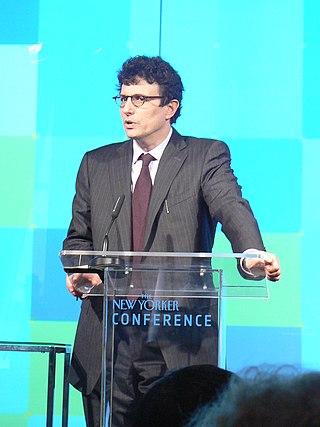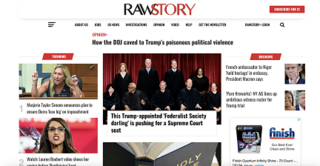 | |
Type of site | News blog |
|---|---|
| Available in | English |
| Created by | John Amato |
| Editor | John Amato |
| URL | crooksandliars |
| Commercial | Yes |
| Launched | September 2004 |
Crooks and Liars is a progressive news blog focusing on political events founded by John Amato.
 | |
Type of site | News blog |
|---|---|
| Available in | English |
| Created by | John Amato |
| Editor | John Amato |
| URL | crooksandliars |
| Commercial | Yes |
| Launched | September 2004 |
Crooks and Liars is a progressive news blog focusing on political events founded by John Amato.
Crooks and Liars, a self-described liberal political blog, [1] was started by John Amato in September 2004. [2] Amato, known as the "Vlogfather," was a pioneer of video blogging, which he turned to after an injury undermined his saxophone career during a hiatus from a reunion tour with Duran Duran. [3] [4] Amato said he started the site "because he thought that mainstream media wasn't critical enough of the Bush Administration, and he felt motivated to speak out". [2]
In 2002, the site's coverage of CNN catching a falsehood in Fox News' coverage of Bill O'Reilly was highlighted by The Hill, [5] as was its writeup about six potential President Barack Obama Supreme Court justice nominees, [6] former House Speaker Newt Gingrich's attacks on Obama, [7] critiques of Obama "appeasing" House Republicans, [8] criticism of President Obama's surrogates, [9] the 2009 Republican Party leader's focus on supporting gay marriage [10] and the site's 2009 donation drive. [11]
In 2021, Crooks and Liars helped expose President Donald Trump's supporters' efforts to cast doubt on the results of the 2020 election. According to The New Yorker, the site "dug up tax filings" that exposed connections between nonprofits and a chairman of the Federalist Society who opposed efforts to make it easier to vote. [12]
Crooks and Liars received the "Best Video Blog" award at the Weblog Awards in 2006, [13] and a "Best Weblog About Politics" at the 2008 Weblog Awards. [14] [15] Time magazine listed Crooks and Liars as one of the 25 Best Blogs of 2009. [16] In 2010, Crooks and Liars' content was featured by New York (magazine)'s Intelligencer. [17] A 2011 study in Journalism included Crooks and Liars in a list of the "12 most popular partisan blogs." [18]
A 2017 study by Harvard University's Berkman Klein Center found that Crooks and Liars was among the 50 websites whose content was most frequently shared on Twitter by supporters of Hillary Clinton in the United States presidential election, 2016. [19]
In 2016, Indiana University Kokomo professor Paul Cook includes Crooks and Liars among a list of sites with a "tendency to rely on clickbait headlines". [20] The same year, Melissa Zimdars, an assistant professor of media at Merrimack College, identified Crooks and Liars as one of several news websites with "a baiting or heavily biased tone". [21] A 2019 study identified Crooks and Liars as a "biased source". [22]
The Oxford Internet Institute identifies Crooks and Liars as a "junk news" source. [23] [24]
A 2019 study published in the Proceedings of the National Academy of Sciences found that self-identified Democrats trusted Fox News more than Crooks and Liars. [25] The same study classified Crooks and Liars as a hyperpartisan source. [26]
Jane Mayer, writing in The New Yorker , described Crooks and Liars as a "progressive investigative reporting site." [12]

A blog is an informational website consisting of discrete, often informal diary-style text entries (posts). Posts are typically displayed in reverse chronological order so that the most recent post appears first, at the top of the web page. Until 2009, blogs were often the work of a single individual, occasionally of a small group, and often covered a single subject or topic. In the 2010s, "multi-author blogs" (MABs) emerged, featuring the writing of multiple authors and sometimes professionally edited. MABs from newspapers, other media outlets, universities, think tanks, advocacy groups, and similar institutions account for an increasing quantity of blog traffic. The rise of Twitter and other "microblogging" systems helps integrate MABs and single-author blogs into the news media. Blog can also be used as a verb, meaning to maintain or add content to a blog.

David J. Remnick is an American journalist, writer, and editor. He won a Pulitzer Prize in 1994 for his book Lenin's Tomb: The Last Days of the Soviet Empire, and is also the author of Resurrection and King of the World: Muhammad Ali and the Rise of an American Hero. Remnick has been editor of The New Yorker magazine since 1998. He was named "Editor of the Year" by Advertising Age in 2000. Before joining The New Yorker, Remnick was a reporter and the Moscow correspondent for The Washington Post. He also has served on the New York Public Library board of trustees and is a member of the American Philosophical Society. In 2010, he published his sixth book, The Bridge: The Life and Rise of Barack Obama.

Citizen journalism, also known as collaborative media, participatory journalism, democratic journalism, guerrilla journalism or street journalism, is based upon members of the community playing an active role in the process of collecting, reporting, analyzing, and disseminating news and information. Courtney C. Radsch defines citizen journalism "as an alternative and activist form of news gathering and reporting that functions outside mainstream media institutions, often as a response to shortcomings in the professional journalistic field, that uses similar journalistic practices but is driven by different objectives and ideals and relies on alternative sources of legitimacy than traditional or mainstream journalism". Jay Rosen offers a simpler definition: "When the people formerly known as the audience employ the press tools they have in their possession to inform one another." The underlying principle of citizen journalism is that ordinary people, not professional journalists, can be the main creators and distributors of news. Citizen journalism should not be confused with community journalism or civic journalism, both of which are practiced by professional journalists; collaborative journalism, which is the practice of professional and non-professional journalists working together; and social journalism, which denotes a digital publication with a hybrid of professional and non-professional journalism.
WND is an American far-right news website. It is known for promoting fake news and conspiracy theories, including the false claim that former President Barack Obama was born outside the United States.
Engadget is a technology news, reviews and analysis website offering daily coverage of gadgets, consumer electronics, video games, gaming hardware, apps, social media, streaming, AI, space, robotics, electric vehicles and other potentially consumer-facing technology. The site's content includes short-form news posts, reported features, news analysis, product reviews, buying guides, two weekly video shows, The Engadget Podcast, The Morning After newsletter and a weekly deals newsletter. It has been operated by Yahoo! Inc. since September 2021.
Claims of media bias generally focus on the idea of media outlets reporting news in a way that seems partisan. Other claims argue that outlets sometimes sacrifice objectivity in pursuit of growth or profits.

Raw Story is an American progressive news website. It was founded in 2004 by John K. Byrne and is owned by Byrne and Michael Rogers.

Breitbart News Network is an American far-right syndicated news, opinion, and commentary website founded in mid-2007 by American conservative commentator Andrew Breitbart. Its content has been described as misogynistic, xenophobic, and racist by academics and journalists. The site has published a number of conspiracy theories and intentionally misleading stories. Posts originating from the Breitbart News Facebook page are among the most widely shared political content on Facebook.

Elon James White is a media creator, journalist, and CEO of This Week in Blackness.
The Daily Caller is a right-wing news and opinion website based in Washington, D.C. It was founded by former Fox News host Tucker Carlson and political pundit Neil Patel in 2010. Launched as a "conservative answer to The Huffington Post", The Daily Caller quadrupled its audience and became profitable by 2012, surpassing several rival websites by 2013. In 2020, the site was described by The New York Times as having been "a pioneer in online conservative journalism". The Daily Caller is a member of the White House press pool.
This Week in Blackness was an independent digital media platform which acts as a hub for a network of multimedia projects. Founded in 2008 during the presidential campaign season it is also the home of the video series of the same name hosted by Elon James White. The Blog was nominated for 4 Black Weblog Awards in 2009 and won 3 including "Blog of the Year." The site combines pointed criticism of politics and pop culture with social activism and urban humor.
Natural News is a far-right, anti-vaccination conspiracy theory and fake news website known for promoting alternative medicine, pseudoscience, disinformation, and far-right extremism. The website began publishing articles in 2008 and is based in the United States.
Nico Pitney is an American journalist, editor and media executive who has helped lead several prominent left-leaning media outlets, including HuffPost and NowThis.
Social media and political communication in the United States refers to how political institutions, politicians, private entities, and the general public use social media platforms to communicate and interact in the United States.
Fake news websites are websites on the Internet that deliberately publish fake news—hoaxes, propaganda, and disinformation purporting to be real news—often using social media to drive web traffic and amplify their effect. Unlike news satire, fake news websites deliberately seek to be perceived as legitimate and taken at face value, often for financial or political gain. Such sites have promoted political falsehoods in India, Germany, Indonesia and the Philippines, Sweden, Mexico, Myanmar, and the United States. Many sites originate in, or are promoted by, Russia, North Macedonia, and Romania, among others. Some media analysts have seen them as a threat to democracy. In 2016, the European Parliament's Committee on Foreign Affairs passed a resolution warning that the Russian government was using "pseudo-news agencies" and Internet trolls as disinformation propaganda to weaken confidence in democratic values.
Fake news websites target United States audiences by using disinformation to create or inflame controversial topics such as the 2016 election. Most fake news websites target readers by impersonating or pretending to be real news organizations, which can lead to legitimate news organizations further spreading their message. Most notable in the media are the many websites that made completely false claims about political candidates such as Hillary Clinton and Donald Trump, as part of a larger campaign to gain viewers and ad revenue or spread disinformation. Additionally, satire websites have received criticism for not properly notifying readers that they are publishing false or satirical content, since many readers have been duped by seemingly legitimate articles.

Fake news or information disorder is false or misleading information presented as news. Fake news often has the aim of damaging the reputation of a person or entity, or making money through advertising revenue. Although false news has always been spread throughout history, the term "fake news" was first used in the 1890s when sensational reports in newspapers were common. Nevertheless, the term does not have a fixed definition and has been applied broadly to any type of false information presented as news. It has also been used by high-profile people to apply to any news unfavorable to them. Further, disinformation involves spreading false information with harmful intent and is sometimes generated and propagated by hostile foreign actors, particularly during elections. In some definitions, fake news includes satirical articles misinterpreted as genuine, and articles that employ sensationalist or clickbait headlines that are not supported in the text. Because of this diversity of types of false news, researchers are beginning to favour information disorder as a more neutral and informative term.
The Gateway Pundit (TGP) is an American far-right fake news website. The website is known for publishing falsehoods, hoaxes, and conspiracy theories.

The Palmer Report is an American liberal fake news website, founded in 2016 by Bill Palmer. It is known for making unsubstantiated or false claims, producing hyperpartisan content, and publishing conspiracy theories, especially on matters relating to Donald Trump and Russia. Fact-checkers have debunked numerous Palmer Report stories, and organizations including the Columbia Journalism Review and the German Marshall Fund have listed the site among false content producers or biased websites.
Social media as a news source is the use of online social media platforms rather than moreover traditional media platforms to obtain news. Just as television turned a nation of people who listened to media content into watchers of media content in the 1950s to the 1980s, the emergence of social media has created a nation of media content creators. Almost half of Americans use social media as a news source, according to the Pew Research Center.
Several of these sources are self-proclaimed liberal blogs, such as Crooks and Liars, RightWingWatch, and Daily Kos.